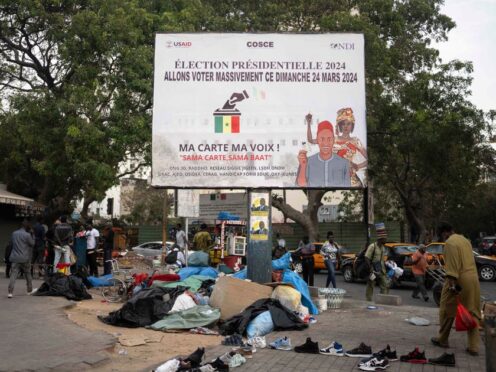
Polls have opened in Senegal in a tightly-contested presidential race which follows months of uncertainty and unrest that has tested the west African nation’s reputation as a stable democracy.
The roads were largely deserted early on Sunday in capital Dakar and the nation’s elite police force were stationed all over the city in armoured vehicles.
Outside polling centres, police checked voters’ cards as men and women in formal dress lined up.
The election takes place after much uncertainty following President Macky Sall’s unsuccessful effort to delay the planned February 25 vote until the end of the year – and then announcing a surprise amnesty for political prisoners.
Two leading opposition figures were released from prison last week to jubilant celebrations.
The election is Senegal’s fourth democratic transfer of power since it gained independence from France in 1960.
It is also the first vote without an incumbent on the ballot since term limits were introduced and there is no clear frontrunner among the 19 candidates, including one woman.
“This is poised to be the most competitive election since the introduction of multi-party politics,” Tochi Eni-Kalu, Africa analyst at the Eurasia Group, told The Associated Press.
Analysts say no candidate is expected to win more than 50% of the vote, which means a run-off between leading candidates is widely expected.
These include Amadou Ba, a former prime minister, and Bassirou Diomaye Faye, who is backed by popular opposition figure Ousmane Sonko.
Mr Sonko, who came third in the previous election, was barred from running in January because of a prior conviction for defamation.
He has faced a slew of legal troubles in recent years that supporters say are part of a government effort to derail his candidacy.
Other potential frontrunners are Khalifa Sall, a former mayor of Dakar unrelated to the president, and Idrissa Seck, a former prime minister from the early 2000s who was runner-up in the 2019 presidential race.
Two candidates dropped out this week to back Mr Faye’s candidacy, a sign of the start of coalition-building that could determine the outcome of the race, according to analysts.
At the forefront of concerns for many Senegalese voters is the economy, which has been squeezed by high food and energy prices partly driven by the war in Ukraine.
Unemployment among the nation’s youth is widespread, driving thousands to risk their lives on dangerous journeys in search of jobs in the West.
Political activist Oumy Sarr said: “Jobs are really, truly the priority. Everyone can see that unemployment is taking over.
“The second priority is the high cost of living in Senegal today. What is to be done to improve people’s living conditions? Inflation is rising, everyone is tired.”

Enjoy the convenience of having The Sunday Post delivered as a digital ePaper straight to your smartphone, tablet or computer.
Subscribe for only £5.49 a month and enjoy all the benefits of the printed paper as a digital replica.
Subscribe